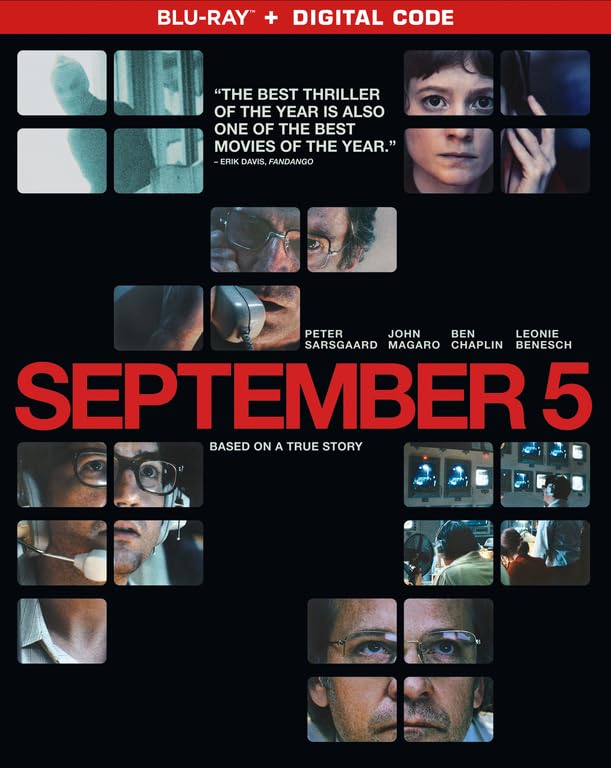
On September 5, 1972, during the Munich Summer Olympics, the first games broadcast live around the world, Palestinian militant group Black September Organization took Israeli Olympic team members hostage within their apartments in response to 200 prisoners being held in prison by the Israeli government. Director, co-producer, and co-writer Tim Fehlbaum creates a fascinating thriller of those events predominantly set within the production facility from which ABC Sports worked.
Buy September 5 Blu-rayAfter Mark Spitz wins a gold in swimming, ABC Sports President Roone Arledge (Peter Sarsgaard) suggests bringing up the Holocaust during his interview. Head of Operations Marvin Bader (Ben Chaplin) pushes back on the idea, serving as the network’s conscious throughout the film, but it’s clear from the outset, Arledge is solely focused on driving up the ratings no matter what ethical questions arise.
After learning that gunshots were in fact heard nearby, Geoffrey Mason (John Magaro), the head of the control room, blows off their Olympic coverage to cover the breaking news. He sends news reporter Peter Jennings (Benjamin Walker) to the athlete village to report on the incident. ABC executives want ABC News to take over the story, but Arledge wants to keep it for his team.
Details leak in from different sources. Marianne (Leonie Benesch), the local translator, listens to the police radio. Jennings reports from an apartment nearby. Assorted TV cameras are live. As images are shown, Mason filters information to sportscaster Jim McKay who reports live to those watching around the world. And also those in the Olympic Village, which is why the German Police shut down the broadcast after a camera caught an attempted rescue.
Negotiations allow the terrorists and their prisoners access to the airport. Jubilation breaks out when the control room learns all the hostages have been freed. Bader suggests they wait for confirmation, but Mason and Arledge don’t want to be scooped by other news organizations, ignoring journalistic ethics in the pursuit of being the first to break news.
For film that is mainly people sitting around talking and making decisions, September 5 keeps viewers engaged as the main characters respond to the off-screen action from a distance. The plot moves at a brisk pace, supported by the editing, but it never feels rushed. Sides aren’t taken regarding the Israeli/Palestinian issue. The story simply details events as they play out on the ground.
The video is displayed at a 1080p/MPEG-4 AVC displayed at various aspect ratios as archival footage of McKay and other material is edited into the film. Colors are desaturated to give the appearance of the era, as does an added film-grain effect since it was shot digitally. Blacks vary in their appearance.
The audio is available in Dolby TrueHD 7.1. The cast can be clearly heard on this dialogue-heavy track. Ambient effects of the newsrooms and composer Lorenz Dangle’s score can be heard in the surrounds but never detract the viewer’s focus.
There are no extras.
September 5 is a captivating film that uses a story from decades ago to shed light on today, particularly the state of television but it can apply to other areas. The script is smart and the cast is a talented ensemble that brings the characters to life and makes them all believable. The high-definition presentation delivers what the source has to offer.